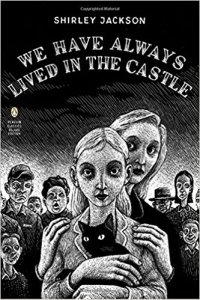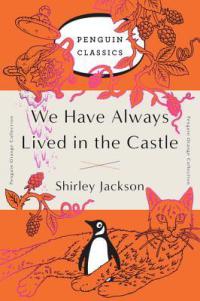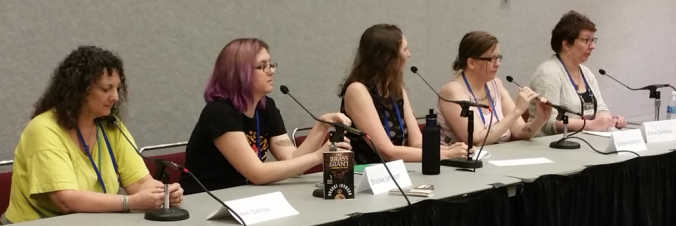 This is another of those ‘the ones that got away’ posts’ This time I’m catching up Shirley Jackson’s We Have Always Lived in the Castle, which I raved about here when I was halfway through, because I was so surprised to discover how brilliant she is, and how much I liked this novel. I didn’t expect to enjoy it because I hated her short story The Lottery, and this slender novel is not my usual style at all. It’s bizarre, macabre, unsettling, disturbing – and utterly compelling. I was totally gripped from the opening paragraph to the last word. I just couldn’t put it down.
This is another of those ‘the ones that got away’ posts’ This time I’m catching up Shirley Jackson’s We Have Always Lived in the Castle, which I raved about here when I was halfway through, because I was so surprised to discover how brilliant she is, and how much I liked this novel. I didn’t expect to enjoy it because I hated her short story The Lottery, and this slender novel is not my usual style at all. It’s bizarre, macabre, unsettling, disturbing – and utterly compelling. I was totally gripped from the opening paragraph to the last word. I just couldn’t put it down.
As I said in my previous post, Jackson writes like a dream, but the tale she tells has a nightmarish quality. Gothic horror doesn’t even begin to describe it and it’s impossible to categorise or find a comparable author. Angela Carter, Barbara Comyns, and Alice Thomas Ellis have all written strange, unconventional novels with a dark edge, and some of the short stories penned by Margaret Atwood, Sara Maitland and Sylvia Townsend Warner are very odd indeed, but I’m not sure any of them quite match Jackson when it comes to weirdly wonderful.
It’s well nigh impossible to write about We Have Always Lived in the Castle without giving the plot away, but it’s become something of a cult classic, and elements of the story seems to be so well known that perhaps spoilers don’t matter. If you don’t want to know what happens then stop reading!

Basically the narrator, Merricat (Mary Katherine Blackwood), and her sister Constance live with their Uncle Julian in a run-down family mansion. Six years ago the girls’ mother, father, aunt and brother all died when someone put arsenic in the sugar bowl. Uncle Julian survived, with his mind and body irreparably damaged; Merricat escaped poisoning because she had been sent to her room for a misdemeanour, and Constance never took sugar. However, she prepared the meal and washed the sugar bowl before the police arrived – there was a spider in it, she claimed. She is tried for murder and acquitted, though local people remain convinced of her guilt. It’s obvious that bad feeling between the Blackwoods and the villagers goes back a long away – well before the murders, but it’s never explained. Once a week Merricat runs the gauntlet of hostile, staring, jeering villagers to change library books and buy groceries, because her sister never ventures beyond the confines of house and garden.
Everything changes when Cousin Charles arrives, seeking the fortune he believes Mr Blackwood has left. He beguiles Constance – and Merricat, excluded from her sister’s new relationship, seeks a way to banish him and restore their usual way of life, but things don’t go according to plan. She sets fire to Charles’ bedroom in the hopes that leave, but the flames spread – and the fire brigade, having extinguished the blaze join the vrowd of villagers in systematically smashing the Blackwood home and possessions to piece. It’s every bit as terifying as the mob that stones a woman to death in The Lottery.
 The girls clad themselves in table cloths and drapes (their clothes have been destroyed), and barricade themselves in the ruined house, while the villagers, ashamed of their actions, take to leaving gifts of food on the doorstep.
The girls clad themselves in table cloths and drapes (their clothes have been destroyed), and barricade themselves in the ruined house, while the villagers, ashamed of their actions, take to leaving gifts of food on the doorstep.
The past unfolds slowly, there is a feeling of unease from the outset, and the tension just keeps on rising, highlighted bythe juxtaposition of everyday normality with the weird. It’s told from Merricat’s perspective, her internal musings, which are frequently very unpleasant, but always entertaining, and it soon becomes apparent that she is not merely a little odd, but deeply, deeply disturbed, and that it is she, not Constance, who is the poisoner. Yet there are times when I wondered if the sisters were complicit in the murders, and it is strange that Constance tells the police her family deserved to die.
Merricat’s life is dominated by her protective charms and rituals – words that she mustn’t say, a buried doll, a book nailed to a tree – that go hand in had with her self-imposed rules on what she can and can’t do. It’s like some kind of instinctive sympathetic magic, but I think there’s more than that; it’s like some obsessive behavioural pattern taken to extremes.
 This all sounds very dark and chilling, and it is, but We Have Always Lived in the Castle also has one of the funniest scenes Ihave ever read in any novel, when an old friend of the sister’s dead mother comes to tea, accompanided by ‘little Mrs Wright’ whose avid curiosity about the murders overcomes her good manners – she can’t bring erself to drink tea or eat any of Constance’s cakes and sandwiches, but she takes a ghoulisjh interest in the details of the murder. And Uncle Julian rises to the occasion magnificently. He is a showman, displayimg his exhibits – the house, its inhabitants and their possessions, and he does it with outrageous charm, old-fashioned courtesy, and a wry sense of humour.
This all sounds very dark and chilling, and it is, but We Have Always Lived in the Castle also has one of the funniest scenes Ihave ever read in any novel, when an old friend of the sister’s dead mother comes to tea, accompanided by ‘little Mrs Wright’ whose avid curiosity about the murders overcomes her good manners – she can’t bring erself to drink tea or eat any of Constance’s cakes and sandwiches, but she takes a ghoulisjh interest in the details of the murder. And Uncle Julian rises to the occasion magnificently. He is a showman, displayimg his exhibits – the house, its inhabitants and their possessions, and he does it with outrageous charm, old-fashioned courtesy, and a wry sense of humour.
“Would you like to view the dining room?” he asked. “The fatal board? I did not give evidence at the trial, you understand; my health was not equal, then or now, to the rude questions of strangers.”
“Madam.” Uncle Julian contrived a bow fron his wheel chair, and Mrs Wright hurried to reach the door and open it for him. “Directly across the hall,” Uncle Julian said, and she followed. “I admire a decently curious woman, madam; I could see at ince that you were devoured with a passion to view the scene of the tragedy; it happened in this very room, and we still have our dinner in here every night.”
He continues with great relish:
“The sugar bowl on the sideboard, the heavy silver sugar bowl. It is a family heirloom; my brother prized it highly. You will be wondering about that sugar bowl, I imagine. Is it still in use? you are wondering; has it been cleaned you may very well ask; was it thoroughly washed I can reassure you at once. My niece Constance washed it before the doctor or police had come.”
 Amidst the horror and oddities everyday concerns loom large. Gardening, cooking, clothes are all important, as are good manners – at the end, despite everything that has happened, when villagers leave food Constance is concerned about what people would think of them if they sent the dish and cloth wrapping back dirty.
Amidst the horror and oddities everyday concerns loom large. Gardening, cooking, clothes are all important, as are good manners – at the end, despite everything that has happened, when villagers leave food Constance is concerned about what people would think of them if they sent the dish and cloth wrapping back dirty.
And nothing is ever explained. When terrible things happen, in fiction, as in life, we like to know why. We look for reasons, justifications, attributions of blame, anything that will make it easier to accept and understand. But Jackson offers no clues. We never know why the family were murdered ( in the afterword Joyce Carol Oates suggests Merricat is suffering from paranoid schizophrenia) or what has caused bad feeling between the Blackwoods and the villagers, but you can see how fear, rumour and suspicion feed prejudice in small town America.
Advertisements Share this:




